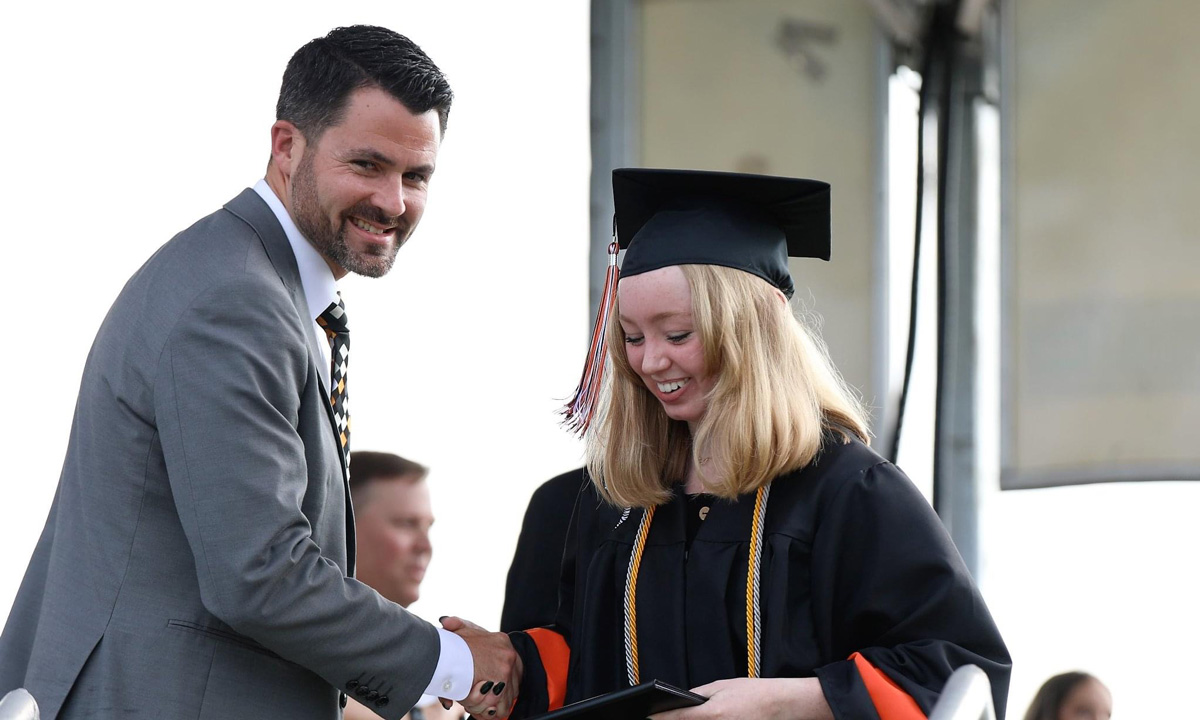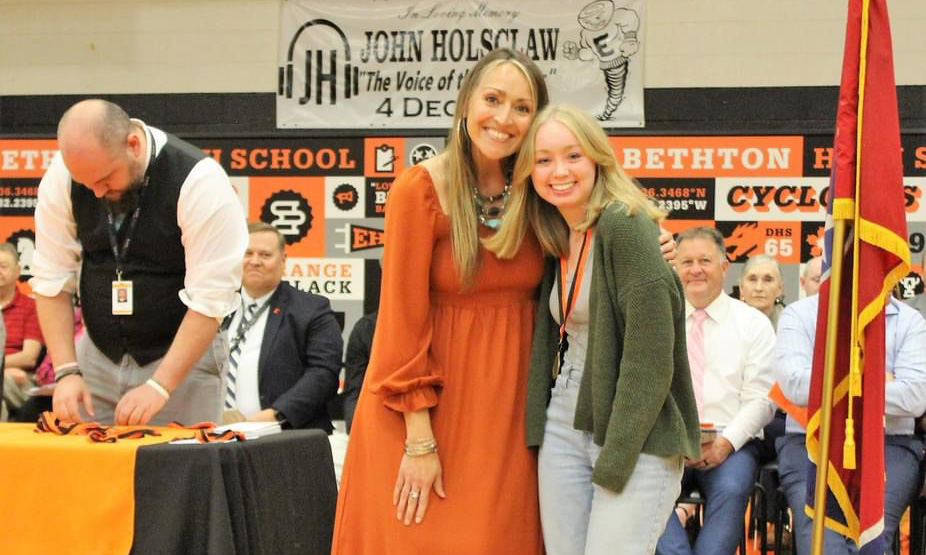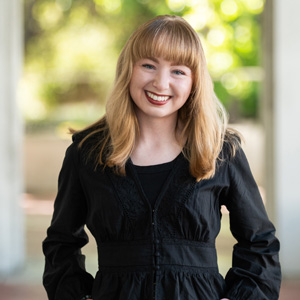Reflections From a Formerly Disengaged Teen
Student’s view: I used to sit in the back of class, trying my best to avoid eye contact with my teacher, but now I sit in the front row every day.

Get stories like this delivered straight to your inbox. Sign up for The 74 Newsletter
I didn’t want to go to college. Sometimes, when I look at how far I’ve come, I have to remember that fact, and then I become thankful all over again for the path I’m on today.
Struggling with debilitating anxiety, only heightened by the realities of a chronically under-resourced public education system, I didn’t even think I’d reach age 18. By 10th grade, in a large public high school in Nashville, Tennessee, I understood one thing: School made me miserable. Why would any student, regardless of capability or potential, want to continue down a path that agonized her?
I needed a fundamental reset. When I was 16, my mom decided it would be best to move back to her hometown of Elizabethton, Tennessee, nearly 300 miles across the state. At the height of the pandemic, we packed up our car, rented a house online, and settled into a small, weathered, and historic town nestled in a valley of the Appalachian Mountains.
Even after moving across the state and starting at Elizabethton High School (EHS) — an XQ School that was less than half the size of my last school — I begged my mom to let me enroll in an online high school instead. This was my chance for a fresh start. Why would I want to go back to a system, albeit in a new town, that I suffered so greatly from?
“Let’s just go talk to the school counselor,” my mom would say.
“We can always do the online school thing, you know, if you hate it here so much,” my aunt would reassure me.
Every muscle in my body fought against walking through the doors of EHS — where many of my family members had graduated. I didn’t want to be a Cyclone. I was convinced that only misery awaited me on the other side. The debilitating, school-induced anxiety began knocking at my door.
Reluctantly, I agreed to a meeting with the school counselor, and two days before the start of the school year, I was enrolled as an 11th grader, expected to report to first-period Spanish on Monday.
What I didn’t expect, however, was the school principal, Jon Minton, walking me to class that fateful Monday, after receiving word of an anxious transfer student from Nashville. This was the first act of kindness of many at EHS, and these acts of kindness have extended far beyond my graduation.
At my old, 2,200-student high school, I never had a sense of community. Isolation, loneliness, and a lack of purpose were the defining characteristics of my first high school experience. Teachers and staff members were overworked and overwhelmed, busy trying to navigate the challenges of our large and diverse high school to form one-on-one connections. Looking back, I can see how important the connections I made at Elizabethton were in helping me find my path. Since then, I’ve learned that my experience is backed by science. Research shows that relationships between students and educators, built on mutual respect, are essential to student success.
As one of the original XQ Super Schools, EHS embraces XQ design principles—among them, the importance of caring, trusting relationships between students and the adults around them. For me, those relationships began to take shape the moment I stepped through the door.
Dr. Minton walked me to my Spanish class, taught by Maggie Booher, a recent college graduate and a brand-new educator about to teach her first class ever. I didn’t see the principal much after that, but knowing that he knew me and had my best interests in mind eased my anxieties in a way I had never experienced.
Like me, Ms. Booher was completely new to the school community. Her energy was infectious, spreading kindness in her classroom and in every part of our school. Throughout my time at EHS, she remained someone I knew I could go to if I needed anything at all.
Within my first five minutes at EHS, I’d made two invaluable connections.
Later that day, my counselor, examining my transcript, placed me in a class dedicated to creating our annual yearbook,a class I got credit for. This one decision was responsible for a chain of events that eventually led me to the path I’m on today.
The yearbook class met in the back of the library. I ate my lunch surrounded by books, often making my way through those doors. There’s sometimes a stigma around students eating lunch in the library, but being able to eat in a comfortable environment where I felt safe, understood, and free from judgment influenced my success as a student. The library was a safe place, and it’s where I met Dustin Hensley.
Calling Mr. Hensley a librarian doesn’t do him justice; he embodies the ideals of a true educator and mentor. He’s an adjunct professor at East Tennessee State University (ETSU), the school I now call home, and the school he encouraged me to apply to. An advocate for student voice and innovative learning, Mr. Hensley created a safe environment for all students within the walls of the library. He has continued to look out for me and send opportunities my way, even years after my graduation. Mr. Hensley’s influence — his “keeping tabs” on me — is why I’m an intern at the XQ Institute today.
Being in the yearbook class made me realize a few things: I love getting to know people through interviews, I enjoy writing for something other than an English class, and I’m passionate about creating tangible, impactful content. These revelations led me to study media and communication at ETSU, and in December, I’ll become the first member of my family to graduate from college.
The yearbook class was taught by Daniel Proffitt. He recognized my interest in journalism, and by my senior year, through his connections, I was already writing for our local newspaper, the Elizabethton Star.
I also managed a team of underclassmen in the class, a leadership opportunity that reflects XQ’s principle of youth voice and choice and one I couldn’t have dreamed of at my previous high school. Mr. Proffitt assisted me with multiple projects in college, another tribute to the impactful relationships I gained at EHS.
In the afternoon, I had one of my final classes: an advanced creative writing course. Sara Hardin became both my advanced creative writing and English teacher. She always pushed me to write in varying styles — poetry, playwriting, prose — nothing was off limits. She taught me about the Transcendentalists, Henry David Thoreau and Ralph Waldo Emerson, and how their thinking revolutionized an age. On one occasion, I recall taking a self-quiz in her class: “Are You a Transcendentalist?” The results were in, and I belonged in the woods with Emerson.

Mrs. Hardin’s classes participated in a competition each fall, in collaboration with a local theater, where students write a play and have the chance for actors to perform their script on stage. During my first semester at EHS, my play placed in the top five—a first for Mrs. Hardin in 20 years. The pandemic kept us from attending the event, but Mrs. Hardin made sure to save me a seat the next year, even though I was no longer in her class.
In my senior year, I was awarded a scholarship to attend ETSU. It was a full-circle moment for me, accepting an award in my favorite place, the library, for a school that I wanted to go to — especially when, a couple of years earlier, I didn’t want to go to college at all.
At that moment, I understood my journey was far from over.
I’d walked into the doors of EHS as a student who felt disconnected and disengaged from school, feeling anxious and alone in my journey, but I walked across the stage as a completely new person—a confident, supported, lifelong learner on my path to higher education.
I used to sit in the back of the classroom, trying my best to avoid eye contact with my teacher, but now I sit in the front row of each class, raising my hand at every opportunity.
The two years I spent at EHS changed my life. My mom and I occasionally wonder: Where would I be if I had never had the opportunity to attend EHS and develop the support system that I still have to this day?
I’ll never know. But here is something I know for sure: I’m proud to have graduated from EHS—and even prouder to be a third-generation Cyclone.
On the day of my graduation, Mrs. Hardin handed me a note. “Don’t stop writing!”
I’m happy to report, I took her advice.
This article was published with the support of XQ Institute.
Want to learn more about how to create innovative teaching and learning in high schools? Subscribe to the XQ Xtra, a newsletter that comes out twice a month for high school teachers.
Disclosure: The XQ Institute is a financial supporter of The 74.
Get stories like these delivered straight to your inbox. Sign up for The 74 Newsletter

;)
